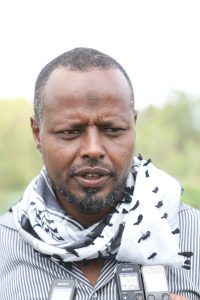
Adane Shume, a resident of Endibir City in Gurage Zone, has had an impressive career journey. From a young age, Adane dreamed of becoming a health professional. His parents supported this goal and sent him to Addis Ababa after high school, where he studied Public Health in a private college.
Upon completing his studies, Adane was employed at a private clinic in Addis Ababa for two years. However, he soon realized that the salary was not enough to cover his living expenses in the city. “The salary I was paid at that time was not enough for rent and my wallet,” Adane explains.
Determined to find a more sustainable path, Adane returned to his hometown and opened a health center in collaboration with his aunt in Endibir town. But even this venture did not prove as profitable as he had hoped.
Undeterred by these challenges, Adane decided to explore a new opportunity to starting a clothing business. He borrowed 30,000 birr from the government to fund the venture. However, his expenses exceeded his earnings, and after four years, he was forced to close the shop.
It was during this period of uncertainty that Adane’s fortunes began to change. He was inspired by the Lemat Turufat initiative, which helped people transform their lives through agricultural work, which he saw on TV. Adane saw the potential in his family’s land, which had been largely devoted to growing eucalyptus trees.
“On my family’s land, which is more than two hectares and has been passed down from generation to generation, only eucalyptus was cultivated. From that, we used to earn not more than one hundred thousand Birr every eight years. But I decided that I should grow a new plant that will earn us more income” Adane explained.
He made the bold decision to clear the old eucalyptus forest and replace it with a diverse array of crops, including banana, avocado, apple, and ginger. This process was not without its challenges, as he had to invest considerable time and money to make the land suitable for these new crops.
Adane’s endeavor paid off when his ginger crop yielded an impressive 24 quintals, which he sold for 156,000 birr for the first irrigation. Encouraged by this success, Adane continued to expand his agricultural operations, planting 1,000 banana seedlings and 1,500 coffee seedlings.
The city administration recognized Adane’s achievements and provided him with a 300,000 birr loan from the Youth Revolving Fund, allowing him to double the size of his farm and increase production.
Currently, Adane’s farm is thriving, with his banana and coffee crops now starting to bear fruit. He has also become a role model for other young people in his community, sharing his experiences and encouraging them to pursue agricultural entrepreneurship.
“Previously, I was working as a security guard in a government office, but now I can afford beyond myself and have become a ray of hope for other young people in my area,” Adane stated.

Not only Adane, but the other central Ethiopian regional state youths are utilizing their efforts in their hometown. For instance, Abdizeki Sehale, a resident of Halaba City, has found success through perseverance and a shift in approach after a difficult experience with illegal immigration.
In 2007/08, he fled Halaba and attempted to illegally migrate to the Republic of South Africa, enduring hunger and suffering during the journey. However, he was ultimately arrested and deported back home. He then realized that the risks of illegal immigration did not guarantee reaching his intended destination.
After returning, Abdizeki began working various jobs, including in local cereal transport for warehouses. But he found these opportunities unsustainable. A few years ago, he decided to focus his efforts on summer irrigation farming.
Currently, Abdizeki’s farm produces a variety of crops, including tomatoes, cabbage, avocados, and bananas, both for personal consumption and to sell to local communities. He employs around 35 permanent and temporary workers, providing much-needed job opportunities in the area.
His venture has been a remarkable success. He reported that in the next three to four years, in addition to achieving self-sufficiency in food, he expects to stabilize living costs by making his products available to surrounding neighborhoods.

Usman Surur, the Rural Development Sector Coordinator and Head of Bureau of Agriculture at the Central Ethiopian Regional State, told The Ethiopian Press Agency that the agricultural specialists of the region closely collaborate with farmers to optimize land utilization, reduce living costs, and ensure food security for the entire community. In recent years, there have been concerted efforts to improve summer irrigation practices in the region through various initiatives and programs.
He highlighted that the Central Ethiopia region started the “30-40-30” initiative under the Lemat Turfat program. This initiative aims to have farmers plant 30 different varieties of fruit in the first year, 40 different varieties of fruit seedlings in the second year, and 30 different species in the third year of planting. As a result, a farmer will have a total of one hundred fruit varieties over three years.
These initiatives aim to enhance the income of the farmers and ensure food security in the communities. This initiative helps to enhance water management practices, promote sustainable irrigation techniques, and provide training and capacity building to farmers, he noted.
For instance, educational programs have been conducted to raise awareness about efficient irrigation methods, water conservation and the importance of crop water requirements. Additionally, the introduction of modern irrigation technologies, such as solar-powered pumps and water-efficient irrigation systems, has been encouraged to optimize water use and reduce energy costs.
The impact of summer irrigation in the region extends beyond crop production. It has positive implications for income generation, poverty alleviation, and rural development. By enabling farmers to cultivate high-value crops during the dry season, irrigation opens up opportunities for market engagement and diversification, he said.
According to him, it improves the region’s economic prospects, particularly when it comes to the cultivation of cash crops like fruits and vegetables, which command higher prices on the market. Enhanced agricultural output also lessens reliance on food assistance and enhances the general financial prosperity of rural communities.
He further stated that the Agriculture Office and the Agricultural Research Institute have been collaborating recently to replace eucalyptus trees with fruits and vegetables. The region has seen a good development as a result of this change, which has an effect on the environment, local communities’ livelihoods, and the economy.
Due to the fact that growing vegetables is more profitable than cultivating eucalyptus trees, many farmers have decided to concentrate on growing bananas, which has enhanced the local economy. He said that because eucalyptus trees may only be harvested for cash once every eight years, farmers and growers have been unable to raise society’s standard of living.
He remarked that the agricultural office is actively pushing the replacement of eucalyptus trees with other quickly-growing cash crops, such as avocados and bananas, in response to these challenges. With their vast root systems, eucalyptus trees compete with other plants for moisture and nutrients.
Farmers become less productive in producing other agricultural goods when the fertility of the agricultural soil declines. This has had a significant effect on the surrounding area, he said. Though eucalyptus is also highly water-intensive, the tree can deplete groundwater resources.
Both the journeys of Adane and Abdizeki are a testament to the power of perseverance and innovation. By embracing agriculture and leveraging the resources available to the country, they have not only transformed their own lives but also inspired others to follow in those tracks. As they continue to expand their operations, their ambition is to become a major player in the export market, producing high-quality agricultural products for global consumption.
The positive impact of their farm extends beyond just the economic benefits. Local youth, who might have otherwise spent their time in drug abuse, are now attracted to the employment opportunities on the farm, providing an alternative and more constructive path.
Furthermore, it serves as an inspiring example of how utilizing a country’s land and natural resources can lead to personal and community-wide transformation, even after facing significant challenges.
BY FIKADU BELAY
THE ETHIOPIAN HERALD SUNDAY EDITION 4 AUGUST 2024




